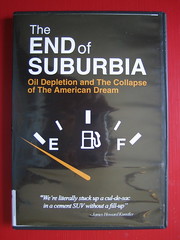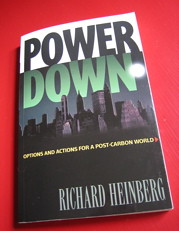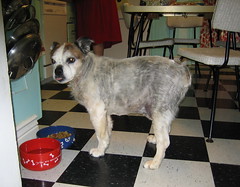Prospects in the Post-Petroleum World
Those in the know have been discussing the "oil crisis" for a year or more and I am just now coming to understand it. Maybe in another year the mainstream news will allow everyone else to know about it, just as they did with global warming. (The special on CNN Sunday night on global warming gave a decent report, but without any urgency about what we might do). I thought this was going to be a downer piece since I was investigating yet another global crisis, but it tapped a dormant vision that I realized I had long been seeking.
The all day workshop that inspired this article was called "Becoming Native: Living in Harmony with this Place: a gathering to envision life in a post petroleum world". The keynote speaker was Richard Heinberg, author of The Party's Over: War, Oil and the Fate of Industrial Societies. As a peace activist I was intensely interested in oil politics. When I read Richard Heinberg's book, I realized that the study of our relationship with oil was so clarifying that it made all my history classes seem like so much myth making. Schools should just teach the history of oil and be done with it.
I recognized many of the people who showed up at the workshop, held on a recent Saturday, at the Foundation for Global Community. There was the young Indian man who ran the Peace and Justice film series. He read my nametag. "Oh you're the professional organizer on Freecycle," he said. He had started the Palo Alto Freecycle group. And since I clean out quite a number of closets in my work organizing clients, I am one of the biggest contributors to Freecycle.
At the door, a tall man from my meditation group was greeting people. We chatted a bit, then my fellow, biointensive organic gardener, hailed me from the parking lot. There, too, was my Sparrow admirer from a recent peace rally who had ridden some 7 miles to attend the workshop on his bicycle. Along with a dozen or more bicycles it was an 8 Prius, one Insight, two electric car event. I plugged my Sparrow into the outdoor outlet of the building, pleased that today my electricity would come from the solar panels on top of the roof.
On KQED the other night, economists and experts discussed the "oil crisis". The experts were all playing down what me and my workshop participants would come to call peak oil. None of them used the term. They talked about how the American economy would "shrug off" this blip in what was at the moment a period of "tight supply" as if soon we would have "normal supply". Not to worry, eventually more discoveries of oil would increase supply again. Isn't that how it had always been?
Yes we do know that oil is a finite resource, but the question we pose is why worry since the glass is still half full and we have all that oil left to figure it out with renewable energy. Surely something else will be invented; look how computers changed our lives. But look again. It's not about us not having anymore, I learned, it's about us having a little bit less than last year and then a little more less and then a great deal more less, because it gets harder and harder to get the oil, like trying to lean into a barrel to scoop out the contents when you're too short to reach more than half way into it and it's all really thick and gooey down there, it's hard to push it into the narrow neck of your coke bottle. The pressure has gone down. The light and bubbly champagne oil is already taken. No more gushers raining down on James Dean in Giant.
What about discovering more? You think geologists haven't gone over every last inch of this rock? The rate of discovery has also gone down. We are about to bring into production the wells that were discovered in the 70's when discoveries peaked. Big brains meet every year to talk about when peak oil in world production will be. The exact date varies from geologist to geologist, but the spread is tightening, circling closer and closer in time to just around 2015.
The important thing about peak oil is that when it gets harder to produce as much oil as we are accustomed to having, the economy will stop growing. Period. Look forward to chronic recession. Our entire existence is built on an everlasting, ever growing economy and now it would have to stop. We simply would not have the cheap oil and cheap energy needed to do all of the energy intensive things we do.
When the speculative dot COM boom crashed and the market went into its cold harsh winter, I was filled with shame at my loss. Others who had been in the stock market comforted me by saying we couldn't have known what would happen. Ah, but some did. They got out in time. They were old hands at investing. They came from old money, or they were savvy business types who were not fooled by the cry of the new economy that this time it was different - the Internet was an ever expanding, super growth machine. I was not going to be taken by surprise again. I wanted to know what would happen.
At the Peace and Justice film series I saw The End of Suburbia, which sounded kind of campy. And it does have a certain wit as it points out that without cheap oil and natural gas (for natural gas was also peaking) the suburbs would become abandoned ghost towns. Finally the end of all those ugly big box, mall driven towns. It did comfort me a little that the density of my own neighborhood was just a little more manageable with a bicycle than most. The most illuminating interview was with Michael Simmons, CEO of the largest energy investment bank, who had been an expert advisor to the Cheney energy plan. How casually he confirmed that yes, energy would be getting harder to come by, and remember that blackout we had across a huge swath of north America and Canada? It happened at exactly peak hour at the end of a run of hot days and though the reason given for the grid going down was that a branch had fallen on a line somewhere, the truth was we were probably at the end of our capacity to generate any more electricity. Peak oil, peak gas, peak electricity generation all at once and our leaders not suggesting we do a thing about it apart from drill in the protected wildlands of Alaska.
Next in the film series was a couple of documentaries about what Cuba did when it lost the support of the Soviet Union and their oil. They imported a passel of bicycles from China and converted their bus factories to make bicycles. Once the Cubans learned how to use them properly (by adding new road signs, bike paths, rider safety education) the bicycle developed a new solidarity among the people; they talked to each other more, helped each other out, rode to the beach en masse. I was fond of bicycles and this scenario warmed the cockles of my heart.
Then a film on how their entire chemical driven agriculture had to turn overnight to organic methods since most of the chemicals and fertilizers were Soviet made (and derived from petrochemicals). And their 75,000 tractors were replaced by oxen. It took practice to drive a team of oxen. Old people with the old skills trained the young. Scientists who studied organic farming methods and were once marginalized were now in demand. Large numbers of the population went to work on farms and got healthier and were better paid. They spoke of how they changed the farming methods from a monoculture to the natural pest management systems familiar to me as an organic gardener. An old man talked of how he thought he would be tired doing this work, but he hadn't felt better. The land sustained him. Best of all was the worm-composting foreman. There was a job description I could fill. Ten thousand tons of worms he bred on a little plot of land. "Now with less, more is being done" was the motto of the post-petroleum Cubans.
To be sure they were a poor people. The look of the towns was very third world and reminded me of Thailand in the early 60's. My cousin would have been the first to leave had this happened in Thailand, just as the wealthy (and the Mafia) had left Cuba when all this came down. Those who remained had no choice, but to make do.
The thing about peak oil is that we are not prepared. We have solutions galore, but not enough of them will be implemented in time and when we do need them we will not have the cheap energy to build them fast enough to accommodate our "not negotiable" uncompromising lifestyle. We will be caught short. It would take 30 years or so to build enough renewables to replace our existing capacity.
So how would we in California envision the post petroleum world? The Saturday workshop that was the culmination of my post petroleum study, was different than the usual solutions oriented positiveness of most workshops. Those who attended were thinner on the whole, had that lean look of lifelong effort, maybe from all that bicycle riding and low fat, sugar free eating. No dessert was served with the all-organic, local farms lunch catered by a local cafe. There was something else too, an acceptance that the world was well past salvation that gave me an odd sense of relief. Now finally we could stop trying to save the world with that dire urgency that if we just recycled everything and changed every light bulb to compact fluorescents and called our congressman every week, we could get it together to prevent disaster.
For this community, that window was gone. This was the message of the keynote speaker. He did not urge us to contact our leaders. The oil men in the White house were obviously aware of the consequences of peak oil, but they were intent on going the route he described as "last man standing" through the use of military force. This would be a very expensive solution, creating a world where only the rich would be able to afford what most of us were enjoying in abundance now, like travel, imported goods, large cars, exotic foods and security.
Since a survivalist, food hoarding, bunker mentality was not in any way appealing, what we could do was build our local community network, Heinberg suggested; become sustainable through the use of our local resources and people, develop skills to grow our own food, make our own shoes I added. (Shoes may be one of those things no longer made in the United States). We were also to save what we could of the natural world and the knowledge accumulated by civilization and entertain ourselves with local musicians since those high production, energy intensive movies and CDs would not be so forthcoming. Being a musician himself, this seemed to be a fitting revenge on the commercial packaging of the entertainment industry.
To inject a lighter mood into the day, we heard from an older woman, from Valley of Heart's Delight, who remembered her grandparents not having a car and being none the worse for it. In fact she looked forward to the end of our consumptive madness and our restless moving about the planet. Finally we could stay put and appreciate a sense of place. We spent the rest of the day in round table discussions sharing ideas - local currency, soup groups, neighborhood tool libraries, co-housing, electric car conversions, shuttle buses and community gardens. The message was we were not going to be able to do it by ourselves; we would have to form cooperatives, work together.
It was with a strange satisfaction that I left the day feeling that my definition of success was going to be realized. No longer would it be a growth motivated, money centered, philosophy of abundance that prevailed. This was not going to be a question of individual greatness and largesse, brought on by an ever improving life, if only I could frame my vision in an upbeat, make-your-own-reality, cosmic love fest, fueled by endlessly positive self-talk and post-it note affirmations.
My definition of success was the downwardly, mobile "slacker" vision that I had started out with. The resistance to material wealth and professional accomplishments, the self-absorbed pursuit of all manner of practical non-money making skills, the cultivation of long conversations with other equally unambitious friends. The longing for the simpler times of my childhood when the unreliable third world electrical grid went down and my extended family of aunts came outside to sit in the dark and talk to me. It was an awake-to-the-moment, off routine, no TV, intimacy that was somehow magical. This, if we could get through the dark times of loss and chaos, was something to look forward to.
Posted concurrently at Energy Bulletin






